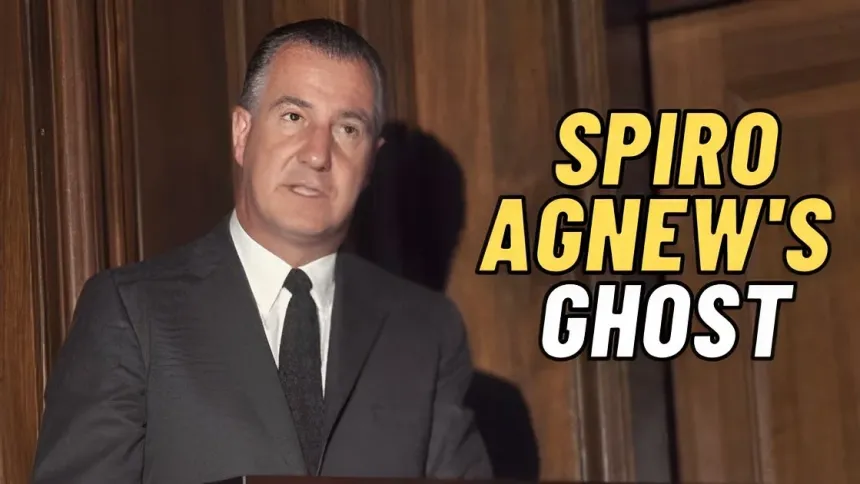
Introduction:
spiro agnew’s ghost, Spiro Agnew, the 39th Vice President of the United States, served alongside President Richard Nixon from 1969 to 1973. While Agnew’s tenure was marked by his fierce conservative rhetoric and staunch opposition to anti-war and civil rights movements, his political career was cut short due to a corruption scandal.
Despite his resignation and subsequent departure from the national stage, Agnew’s influence and controversial legacy continue to cast a ghostly shadow on American politics. MUST READ
Early Life and Political Ascent:
Spiro Theodore Agnew was born on November 9, 1918, in Baltimore, Maryland, to Greek immigrant parents. He attended Johns Hopkins University and later studied law at the University of Baltimore School of Law. Agnew’s early political career began in 1957 when he won a seat on the Baltimore County Board of Zoning Appeals.

He subsequently served as County Executive of Baltimore County from 1962 to 1966, earning a reputation as a tough and conservative leader. MUST READ
Vice Presidency and Conservative Ideology:
In 1968, Richard Nixon, the Republican presidential nominee, selected Agnew as his running mate. Agnew’s selection appealed to conservative voters who saw him as a strong advocate for law and order in the face of social unrest. Once in office, Agnew delivered several highly publicized speeches criticizing the media, anti-war activists, and civil rights leaders. MUST READ
His controversial remarks often garnered strong support from conservative Americans while drawing sharp criticism from liberal factions.
Fall from Grace:
Agnew’s political career took a dramatic turn in 1973 when he became embroiled in a corruption scandal. He was accused of accepting bribes, kickbacks, and extortion payments during his time as Baltimore County Executive and Governor of Maryland. Facing imminent impeachment, Agnew resigned from office on October 10, 1973. He was the first U.S. Vice President to resign due to criminal charges. MUST READ

Legacy and Influence:
While Agnew’s tenure was marked by controversy and scandal, his impact on American politics cannot be ignored. He championed a conservative ideology that resonated with a significant portion of the population, particularly during a time of social and political upheaval.
Agnew’s hardline stance on law and order, anti-communism, and opposition to civil rights and anti-war movements reflected the sentiments of many conservative Americans at the time. MUST READ
Spiro Agnew’s Ghost in Contemporary Politics:
Despite his resignation and departure from the national stage, Agnew’s influence continues to reverberate through contemporary American politics. His aggressive style of political discourse, characterized by inflammatory rhetoric and personal attacks, has become more prevalent in recent years.

Agnew’s tactics, once considered outside the political norm, have seeped into the mainstream, contributing to the heightened polarization and divisiveness in modern politics. MUST RAED
Furthermore, Agnew’s fall from grace serves as a cautionary tale of the consequences of unchecked corruption in politics. His resignation and subsequent criminal conviction sent shockwaves through the nation, leading to increased scrutiny and demand for greater transparency and accountability in public office.
Must Read=merchant cash advance blursoft
Conclusion:
Spiro Agnew’s legacy remains a contentious topic in American political history. While his tenure as Vice President was marked by polarizing rhetoric and a scandalous downfall, Agnew’s influence continues to shape the political landscape.
As we navigate the complexities of modern politics, it is essential to reflect on the lessons learned from Agnew’s tenure and work towards a more inclusive, transparent, and responsible system of governance. Only then can we ensure that the ghosts of our past do not haunt the future of our democracy.
FAQS
Q: Who was Spiro Agnew?
A: Spiro Agnew was the 39th Vice President of the United States, serving from 1969 to 1973 under President Richard Nixon. He was known for his conservative ideology and controversial rhetoric.
Q: What were some of Spiro Agnew’s political views?
A: Agnew held conservative views on various issues. He was a staunch opponent of anti-war and civil rights movements, often criticizing them in his speeches. Agnew also advocated for law and order, anti-communism, and conservative fiscal policies.
Q: Why is Spiro Agnew’s legacy controversial?
A: Agnew’s legacy is controversial due to his involvement in a corruption scandal. He was accused of accepting bribes, kickbacks, and extortion payments during his time as Baltimore County Executive and Governor of Maryland.
He ultimately resigned from the Vice Presidency in 1973 and pleaded no contest to charges of tax evasion.
Q: How did Spiro Agnew’s resignation impact American politics?
A: Agnew’s resignation was a significant event in American politics. It led to increased scrutiny and calls for greater transparency and accountability in public office. The scandal also contributed to a sense of disillusionment and distrust among the American public towards politicians and government institutions.
Q: What is the significance of Spiro Agnew’s ghost in contemporary politics?
A: Spiro Agnew’s ghost refers to the lingering influence and impact of his political rhetoric and tactics in modern politics. His aggressive style of discourse, characterized by personal attacks and inflammatory language, has become more prevalent in recent years.
Agnew’s legacy serves as a reminder of the polarization and divisiveness that can result from such political strategies.



